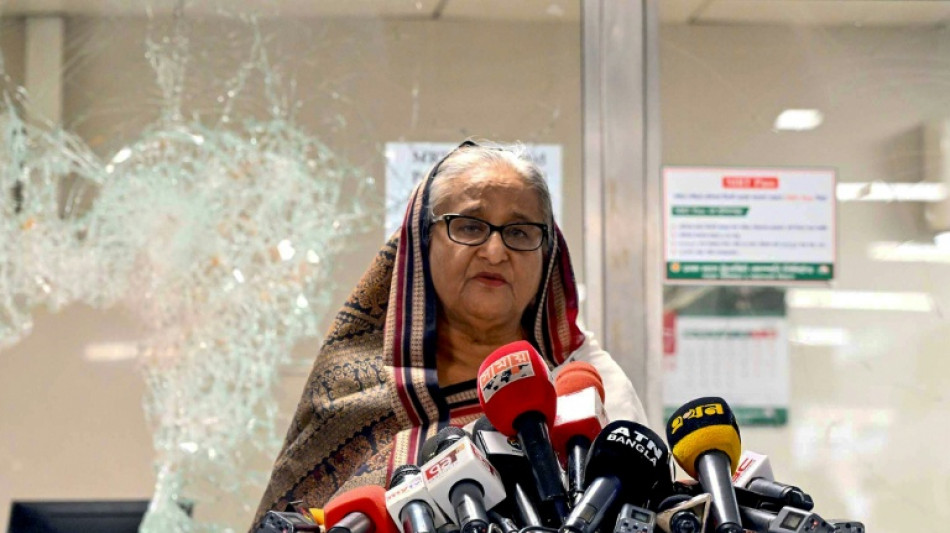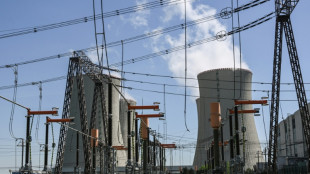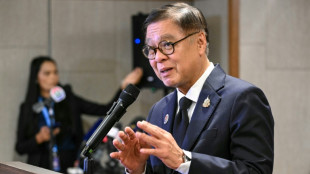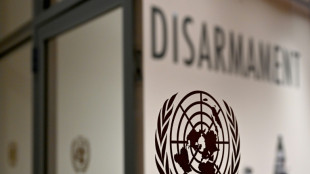
Fugitive ex-PM says Bangladesh vote risks deepening divide

Bangladesh's fugitive ex-leader Sheikh Hasina warned Wednesday that holding elections without her party -- the first since her overthrow -- was "sowing the seeds" of further division in her country.
In written responses to AFP, her first interview since being ousted, Hasina also condemned her crimes against humanity trial as a "jurisprudential joke", adding she believed a guilty verdict was "preordained".
Toppled in August 2024 by a student-led uprising that ended her 15-year autocratic rule, Hasina fled by helicopter as crowds stormed her palace.
The UN says up to 1,400 people were killed in crackdowns as she tried to cling to power -- deaths now at the centre of her trial.
The 78-year-old former prime minister has been in hiding ever since, hosted by old ally India.
But she remains defiant, and, in comments likely to enrage the many who say she made a ruthless bid to maintain power at all costs, she said she "mourned all the lives lost during the terrible days" when students were gunned down in the streets.
She warned that the ban on her Awami League by the interim government of Nobel laureate Muhammad Yunus was deepening a political crisis in the country of 170 million people, ahead of elections slated for February 2026.
"Elections without the direct participation of all major parties, including the Awami League, cannot be credible," she said.
While she has issued social media messages to supporters, her response to AFP marks her first direct communication with journalists since her overthrow.
"Without the participation of the Awami League, he is sowing the seeds of future division in the country," she added.
"Yunus must reinstate the Awami League to give Bangladeshis the choice they deserve."
- 'Capital crimes' -
Rights groups long accused her government of a litany of abuses, including the murder of rivals, suppression of opposition parties, rigged courts and one sided elections.
Bangladesh's interim government banned Hasina's Awami League in May under amendments to the anti-terrorism act -- a move Human Rights Watch condemned as "draconian".
"Free and fair elections require genuine competition, the ability of all parties to campaign, and the electorate's right to choose between alternatives," Hasina said.
"Elections are a competition of ideas. You cannot ostracise a party because you don't like their policies."
Her rivals, long crushed under her rule, are now resurgent.
The Bangladesh Nationalist Party (BNP) is seen as the frontrunner, while Jamaat-e-Islami, the Muslim-majority country's largest Islamist party, is rising in popularity.
Hasina meanwhile has defied court orders to return to attend her trial on whether she bears command responsibility for the deadly crackdown, charges amounting to crimes against humanity under Bangladeshi law.
Chief prosecutor Tajul Islam has accused Hasina of being "the nucleus around whom all the crimes were committed" during the uprising, and has called for the death penalty if found guilty.
"The charges themselves are rejected in full and are not supported by any evidence," Hasina said.
"It has been appointed by an unelected administration consisting of my political opponents to try me in absentia for capital crimes."
A verdict is due on November 13.
"A guilty verdict is pre-ordained, sadly, and I will not be surprised when it comes," she said.
- 'Open fire on crowds' -
Hasina was defended by a state-appointed lawyer, but said she would only recognise an "impartial" process, such as one at the International Criminal Court (ICC).
"The charge that I personally directed security forces to open fire on crowds is bogus," she said, although she admitted that "some mistakes were certainly made within the chain of command".
"But on the whole, the decisions made by senior government officials were proportionate in nature, made in good faith and intended to minimise the loss of life."
The prosecution, who insist the trial was fair, have played audio tapes verified by police that suggested Hasina directly ordered her security forces to "use lethal weapons" against protesters.
Hasina claimed the recordings had been "taken out of context".
She also pointed to a crackdown on her loyalists since her fall, including when security forces in February launched "Operation Devil Hunt", arresting thousands accused of trying to "destabilise" the country.
At the same time, she gave no information on the fate of the hundreds, if not thousands, of missing victims reported to have vanished into secret detention centres during her rule.
Earlier this month, lawyers for the Awami League requested that the ICC investigate reported "retaliatory violence".
This includes allegations of "beatings and lynchings" which have "no realistic prospect" of being prosecuted in Bangladesh, senior British barrister Steven Powles KC said in a statement.
As for the future, when asked by AFP if she plans a return to politics, Hasina replied: "My priority is the welfare and stability of Bangladesh."
D.Czajkowski--GL

 London
London

 Manchester
Manchester
 Glasgow
Glasgow
 Dublin
Dublin
 Belfast
Belfast
 Washington
Washington
 Denver
Denver
 Atlanta
Atlanta
 Dallas
Dallas
 Houston Texas
Houston Texas
 New Orleans
New Orleans
 El Paso
El Paso
 Phoenix
Phoenix
 Los Angeles
Los Angeles



